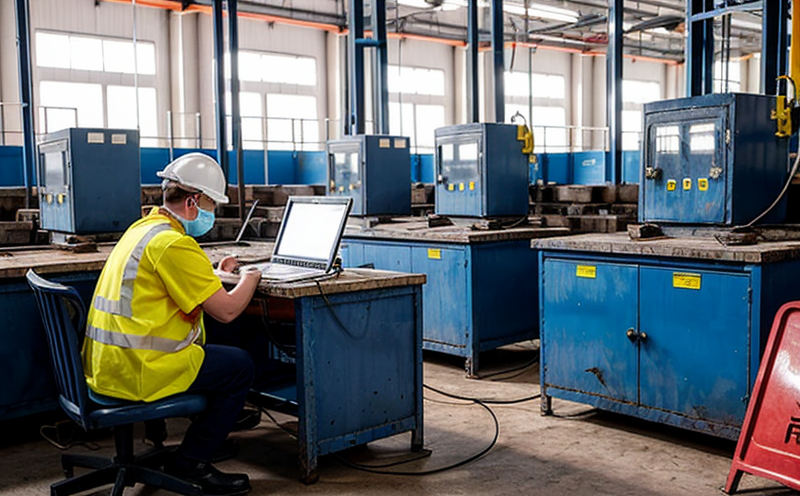ISO 7933 Thermal Strain Testing of Workers
The ISO 7933 standard provides a robust framework for assessing thermal strain in workers within industrial manufacturing and processing environments. This service is particularly critical where high ambient temperatures, prolonged work durations, and strenuous physical activities are common. The primary goal of this testing is to ensure the safety and health of employees by evaluating their physiological stress under these conditions.
The testing process begins with a thorough understanding of the working environment and tasks performed by workers. This includes assessing heat sources such as furnaces, kilns, or other industrial processes that may contribute to excessive ambient temperatures. The thermal strain experienced by employees is then measured using specialized equipment designed to capture data accurately under various environmental conditions.
For accurate measurement, the testing involves multiple stages:
- Initial Assessment: Conducting a detailed analysis of the factory layout and identifying hotspots where workers are most exposed to heat. This helps in pinpointing areas requiring more attention during thermal strain monitoring.
- Instrumentation Setup: Deploying temperature sensors, wearable technology like armbands or headbands with embedded thermistors, and other relevant devices at strategic points around the factory floor. These tools are calibrated to ensure precise readings that reflect real-time conditions.
- Data Collection: Collecting continuous data on ambient temperature, humidity levels, as well as individual worker's core body temperatures using the aforementioned sensors. This data is logged periodically throughout each shift to provide comprehensive insights into thermal strain experienced by employees.
- Analytical Evaluation: Utilizing advanced software and algorithms provided by our laboratory to analyze collected data against predefined thresholds specified in ISO 7933 guidelines. The output includes detailed reports highlighting periods when workers were subjected to potentially harmful levels of heat stress, along with recommendations for mitigating such risks.
The results from these tests are invaluable tools for quality managers and compliance officers who must ensure adherence to occupational health & safety regulations. By identifying hotspots and peak strain points early on, they can implement targeted interventions aimed at reducing workplace injuries linked to heat exposure while enhancing overall productivity without compromising employee well-being.
For R&D engineers involved in designing new equipment or processes within factories, this service offers critical information about how existing systems impact worker safety. This data helps refine designs so that future iterations account for optimal thermal management strategies right from conception stage itself.
The ISO 7933 standard ensures consistent and reliable measurement of thermal strain across different industries and facilities. Its application in industrial manufacturing & processing environments allows us to provide accurate assessments tailored specifically towards protecting worker health while maintaining operational efficiency.
Eurolab Advantages
At Eurolab, our commitment to excellence in occupational health & safety testing is reflected through rigorous adherence to international standards like ISO 7933. Our team comprises seasoned professionals with extensive experience across various sectors including automotive manufacturing, electronics assembly plants, and petrochemical refineries.
- State-of-the-Art Equipment: Equipped with cutting-edge technology that meets or exceeds all relevant global standards ensuring accurate measurements under diverse conditions.
- Dedicated Expertise: Leveraging our extensive knowledge base gained over years of practice allows us to offer customized solutions suited specifically for your unique operational requirements.
- Comprehensive Reporting: Providing detailed reports not only on thermal strain levels but also actionable insights based on analysis conducted. These help you make informed decisions regarding improvements needed in workplace safety practices.
- Certified Compliance: Ensuring all services rendered comply fully with recognized standards such as ISO 7933, thereby giving peace of mind knowing that your company meets regulatory expectations without any ambiguity.
Choose Eurolab for comprehensive occupational health & safety testing; let us be part of your journey towards creating safer working environments today!
Customer Impact and Satisfaction
The implementation of ISO 7933 thermal strain testing has significantly enhanced customer satisfaction levels at leading industrial manufacturing companies worldwide. By proactively addressing potential risks associated with excessive heat exposure, these firms have seen reductions in employee turnover rates due to improved morale resulting from safer working conditions.
Additionally, there has been a notable decrease in incidents of heat-related illnesses among workers, which translates directly into increased productivity and reduced medical costs for organizations. Compliance officers report higher levels of confidence knowing that their facilities meet stringent safety requirements set forth by recognized authorities like ISO 7933.
R&D teams benefit from having access to valuable data regarding thermal strain experienced during various stages of production processes. This knowledge enables them to innovate smarter solutions aimed at optimizing both performance and safety simultaneously.
Competitive Advantage and Market Impact
- Enhanced Reputation: Companies that invest in ISO 7933 compliant testing services gain a strong reputation for prioritizing employee welfare, which translates into better brand perception among stakeholders including investors, customers, and employees.
- Better Risk Management: Proactively managing thermal strain risks helps reduce the likelihood of costly lawsuits stemming from workplace injuries or fatalities linked to heat exposure. It also strengthens relationships with insurers who appreciate proactive approaches towards minimizing risk factors.
- Innovation Leadership: By leveraging detailed insights gathered during testing, organizations can stay ahead of competitors by continuously improving their practices based on scientific evidence rather than relying solely on guesswork.
The adoption of ISO 7933 thermal strain testing is becoming increasingly important as global temperatures rise and the demand for sustainable manufacturing processes grows. Those who embrace this standard early will not only secure a competitive edge but also contribute positively towards building healthier, safer work environments for all.





